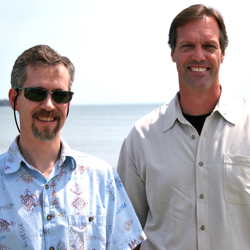Duffy and Lipcius win Leopold Fellowships
Two Virginia Institute of Marine Science faculty members—Drs. Emmett Duffy and Rom Lipcius—are among 18 environmental scientists from the U.S. and Canada who have been awarded 2006 Aldo Leopold Leadership Fellowships.
As Leopold Fellows, Duffy and Lipcius will participate this year in two intensive week-long training sessions designed to promote effective communication of science beyond traditional academic audiences.
"Academic scientists often lack the special communication skills necessary to give decision makers the information they need to address pressing environmental challenges," says Stanford University Professor Pamela Matson, who chairs the Leopold program's advisory committee. "The Leopold Leadership Program provides them with critical skills and intensive training to do so more effectively."
The Leopold program, based at Stanford University's Woods Institute for the Environment, is named after the influential American conservationist Aldo Leopold, who helped lead the movement for wilderness preservation in the United States and was instrumental in defining modern environmental ethics. Leopold is author of A Sand County Almanac, one of the classics of American environmental literature.
Duffy is a marine ecologist whose current research uses experimental seagrass beds to explore how the loss of biodiversity might affect the Chesapeake Bay ecosystem. Lipcius is an expert on the ecology and management of the Bay's blue crab stocks. Both researchers will have ample opportunity to use Leopold training during their frequent interactions with policy makers, watermen, resource managers, and journalists.
 Duffy says he looks forward to the training because he thinks it will help him to "fight for the objectivity of science and the role of rational thinking in decision-making." "The training sessions give participants the language and means of communication to do that," says Duffy. "It will help to bring us down out of the 'Ivory tower' and begin talking more effectively with people in the community."
Duffy says he looks forward to the training because he thinks it will help him to "fight for the objectivity of science and the role of rational thinking in decision-making." "The training sessions give participants the language and means of communication to do that," says Duffy. "It will help to bring us down out of the 'Ivory tower' and begin talking more effectively with people in the community."
Lipcius echoes those sentiments. "As scientists, we typically don't get training to communicate with general audiences or to negotiate. The Leopold training will help me become a more effective conservationist by improving my ability to help shape conservation and restoration strategies for blue crabs and oysters in the Bay."
VIMS is the only institution with two faculty members selected for the 2006 awards. Other recipients hail from Colorado State University, Oregon State University, Stanford, Texas A&M, the University of British Columbia, University of California, University of Hawaii, University of Washington, University of Wisconsin, and the Woods Hole Oceanographic Institution.
"The selection of not one but two of our faculty members for this prestigious fellowship reflects very highly on the quality of our efforts in advisory service, education, and research," says VIMS Dean and Director John Wells.
Leopold fellows are selected through a competitive application process open to mid-career academic environmental scientists in the U.S., Canada, and Mexico. They are expected to use their training to enhance their professional activities both within and outside the scientific community, and to incorporate components of the training into their undergraduate and graduate courses and other outreach activities.
Following their training, Duffy, Lipcius, and the 16 other 2006 fellows will become part of the Leopold Leadership Network, a developing "community of practice" of 100 academic scientists and past fellows who are skilled communicators of scientific information to policy makers and other non-scientists on a wide range of pressing environmental issues.
The Leopold program was founded in 1998 by Jane Lubchenco, distinguished professor of zoology at Oregon State University, and is funded by the David and Lucile Packard Foundation.
